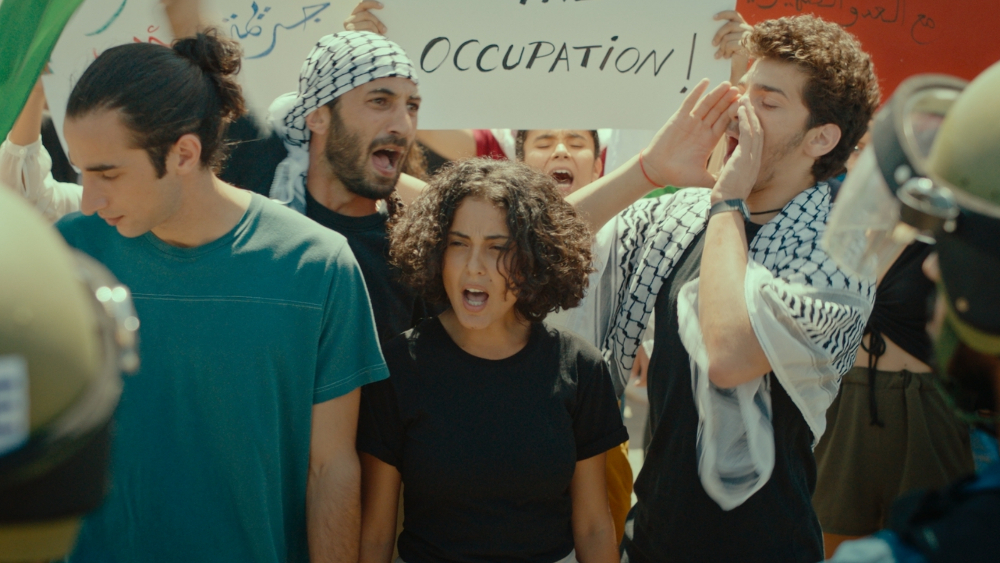Exploring the narrative of “Dear Tarkovsky”: A cinematic journey through Palestinian resistance
Firas Khoury, the Palestinian filmmaker known for his award-winning film “Alam” (The Flag), is back with a new project that promises to be as provocative and compelling as his debut. Titled “Dear Tarkovsky,” this film delves into the life of Farouk, a 35-year-old resident of Ramallah who dreams of making his first film, “A Bridge to Jaffa.” This period piece centers on a Palestinian resistance fighter, reflecting Khoury’s own struggles and aspirations as a filmmaker.
The struggle for artistic expression
Farouk, much like Khoury himself, is a graduate of a Russian film school and a devotee of the Soviet auteur Andrei Tarkovsky. However, Farouk’s reality is far from the artistic utopia he dreams of. To make ends meet, he produces wedding videos, a far cry from the cinematic masterpieces he envisions. His frustration mounts as he struggles to finance his film, which includes scenes of armed combat with Israeli soldiers. This narrative is not just a plot device but a reflection of the real-life challenges faced by Palestinian filmmakers.
A scheme gone awry
In a desperate bid to fund his film, Farouk concocts a scheme to con one of Ramallah’s richest and most corrupt men out of his money. However, the plan takes an unexpected turn when Farouk falls for the tycoon’s daughter. This twist adds a romantic comedy element to the film, making it a multi-genre narrative that promises to keep audiences engaged.
The personal is political
Khoury’s own experiences heavily influence “Dear Tarkovsky.” His debut film, “Alam,” was a politically charged narrative about Palestinian-Israeli teens plotting to replace the Israeli flag with a Palestinian one. Despite its success, Khoury faced significant challenges in financing the film. He hopes that “Dear Tarkovsky” will not be a repeat of this struggle. “It took me 10 years to finance my first film,” he said. “[Palestinian filmmakers] are mainly financed by European funds which are more interested in erasing our story than showing it.”
Khoury is vocal about the limitations imposed on Palestinian filmmakers. “I think every Palestinian director and every Palestinian screenwriter, including me, knows in their subconscious they are not allowed to tell a story of a Palestinian resistance fighter, because he’s considered a terrorist,” he explained. “In ‘Dear Tarkovsky,’ I talk about the fact that Zionism deprives us of our narrative and our ability to tell our story.”
A global collaboration
“Dear Tarkovsky” is produced by Asma Chiboub for Tunis-based Atlas Vision, in co-production with Italy’s Dugong Films and Sweden’s Fox in the Snow Films. The film draws inspiration from Tarkovsky’s “Nostalgia,” which tells the story of a Russian poet and his interpreter who travel to Italy to research the life of an 18th-century composer. Khoury sees both films as portraits of artists in exile, with Farouk growing increasingly disconsolate over both his personal struggle as a filmmaker and the situation in Palestine.
The impact of current events
With the war in Gaza approaching its one-year anniversary, Khoury admits that it has been difficult to stay focused on filmmaking. “I can’t bring myself to work. In a place where an open genocide is happening, everything loses its meaning,” he said. “I make films with a cause. I always make films with a cause. Being from an occupied place, from a hard reality, I try to make films to affect the world. To give us freedom.”
Khoury’s passion for storytelling is evident, but so is his frustration. “I love cinema. I love telling stories. But the stories that I want to tell are stories about occupation, in one way or another,” he continued. “Everything loses its meaning. It’s hard. It’s hard to be creative in such times. It’s hard to believe that your film will make a difference.”
A call for support
The Durban FilmMart, which will showcase Palestinian filmmakers as part of its 15th edition, marks the first time Khoury will pitch “Dear Tarkovsky” to an audience of prospective financiers and partners. Reflecting on the significance of presenting his film in South Africa, Khoury referenced Nelson Mandela’s efforts to find allies in the struggle against apartheid. “They asked him, ‘Why do you support Arafat or Castro or people like this?’ He said, ‘Because they support me,'” Khoury recalled. “I’m looking for anyone who will support my struggle to tell this story.”
Khoury’s plea is not just for financial support but for a broader understanding and acceptance of the Palestinian narrative. “Till today, the whole media around the world consider a Palestinian who raises arms in order to defend his land a terrorist. It is ridiculous. We will tell a different story.”
“Dear Tarkovsky” is more than just a film; it’s a testament to the resilience and creativity of Palestinian filmmakers. As Khoury continues to navigate the challenges of his craft, his story serves as a powerful reminder of the importance of artistic expression in the face of adversity.

 Italian
Italian







